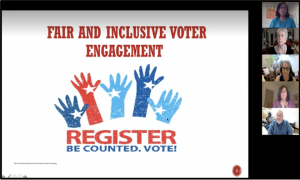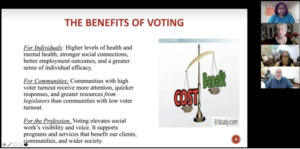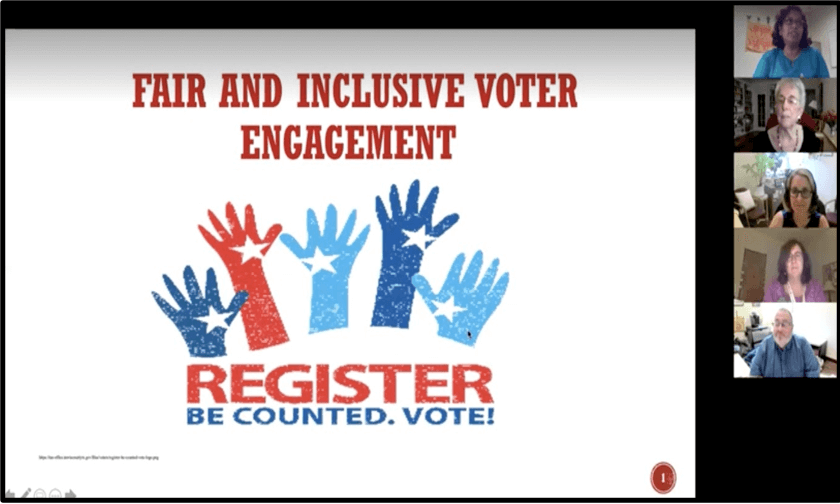
Co-authored by Anna Gwiazda and Vicki Lekkas
On Tuesday, September 14, 2021, Monmouth University’s School of Social Work hosted a listening session, titled “Social Workers, the Vote, and U.S. Democracy.” The event was co-sponsored by the Institute for Global Understanding and other organizations at Monmouth University. Dr. Sanjana Ragudaran, Associate Professor of Social Work at Monmouth University, moderated the session. The first speaker was Professor Mimi Abramovitz, the Bertha Capen Reynolds Professor of Social Policy at Silberman School of Social Work at Hunter College, and Co-Chair of the National Social Work Voter Mobilization Campaign. The second speaker was Dr. Terry Mizrahi a Professor (Emeritus) at the School of Social Work at Hunter College, Co-Chair of the National Movement to Advance Macro Practice in Social Work, and Co-Chair to the National Social Work Voter Mobilization Campaign. The primary focus of the session was on social workers’ role in advocating and making it accessible for all individuals to practice their civic duty of voting. This session was the first of a four-part series this fall, “Growing Together as Allies,” which addresses voting, advocacy, and action.
Professor Abramovitz explained how the current political system is plagued with voter suppression ideologies and laws that restrict voting accessibility. She shared the troubling statistic that “80 million eligible voters did not register in 2020 or more than 24 percent of the eligible population,” which does not account for the individuals who were registered to vote but never showed up to the polls. Professor Abramovitz recommended that all social workers ask their clients in a non-partisan manner if they are registered to vote and provide them with resources to do so. Additionally, she encouraged social work students, practicing social workers, faculty, and all individuals to visit the following website (https://votingissocialwork.org) to access free training, campaign activities, and other resources.
Dr. Mizrahi, a respected community organizer, explained a social worker’s responsibility for advocating against injustice on a larger scale. She referred to an ethical standard in the National Association of Social Worker Code of Ethics, which provides that social workers should “facilitate informed participation by the public in shaping social policies and institutions.” Dr. Mizrahi then described principles and tools of community organizing to combat laws that restrict voting and make voting less accessible. 
The Institute for Global Understanding recognizes the UN Sustainable Development Goals (SDGs) as the gold standard in the promotion of an equal, just, and prosperous world. Throughout the listening session, the speakers highlighted the challenges our country faces with voter suppression and voting accessibility. This injustice conflicts with SDG number 16, which seeks to promote “peaceful” and “inclusive societies.” Urgent action is needed to protect and promote voting because democracy is the foundation upon which our government was built. For more information and to resources on how to encourage voting please visit the (https://votingissocialwork.org) webpage.
Access a recording of the Social Workers, the Vote, and US Democracy Listening Session Here. To learn more about the other listening sessions hosted by the School of Social Work Growing Together as Allies Fall 2021 Speaker Series, please click here.

